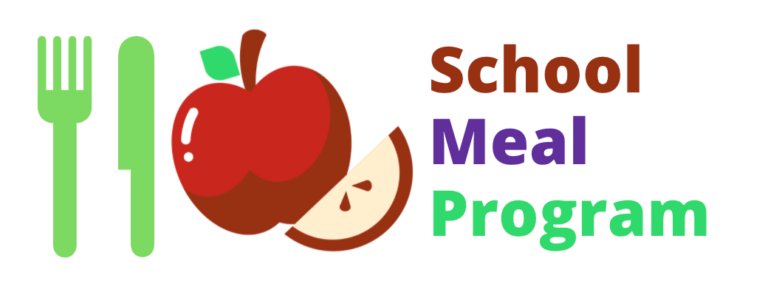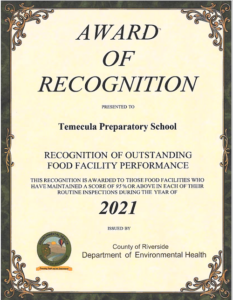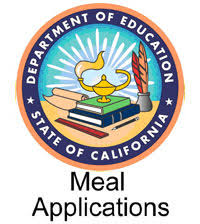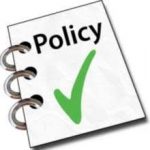
Meal Program Information
A USDA waiver allows our Lunch Program to provide FREE breakfast and lunch. Meals are prepared and provided by Unity Meals and served by TPS food program staff.

Breakfast is available at gate opening times. Lunches are provided during a student’s scheduled lunch time.
Earn Income Tax Credit Information
The California Revenue and Taxation Code (RTC) Section 19853(b) requires local educational agencies (LEA) that operate the National School Lunch Program to annually notify households about the Earned Income Tax Credit (EITC) Information Act.
The EITC is a benefit for working people with low to moderate income. In order to qualify for the EITC, households must meet certain requirements and file a tax return, even if taxes are not owed or households are not required to file. The EITC reduces the amount of tax households owe and may allow for a refund.
Please click on the links below for additional information:
EITC Information Links – English / Spanish
Meals, foods and beverages sold or served at schools meet state and federal requirements which are based on the USDA Dietary Guidelines. We provide students with access to a variety of affordable and appealing foods that meet the health and nutrition needs of students.

QUESTIONS?
If you have any questions, please email our lunch program directly at TPSLUNCH@TEMECULAPREP.COM
This institution is an equal opportunity provider.

Links to Important Free & Reduced Meal Information
Free & Reduced Meals
Free or reduced-price lunches are available at school for pupils whose parents or legal guardians qualify, based on annual household income, and complete the required application form. Application forms may be obtained through Temecula Preparatory School.
TPS takes part in the National School Lunch Program. Nutritious meals (breakfast and lunch) are served every school day for free. Free and Reduced Lunch applications are available to qualify for other benefits. Applications are available during registration, in the School Office, or in the food distribution room. Please complete only one application per household and return the completed application to the School Office. Applicants will receive notice by mail indicating their students’ eligibility once the application has been processed.
Factors considered in the application process are household size and total household income. HOUSEHOLD SIZE is considered all persons, related or unrelated: Including parents, children, grandparents who live in your home and share living expenses The TOTAL HOUSEHOLD INCOME is the income each household member received last month before taxes – this includes wages, social security, pension, unemployment, welfare, child support, alimony, and any other cash income.
School Meal Policy
To print a copy of the policy, please click on the image below.
The Governing Board intends that, insofar as possible, the school food services shall be a self-supporting, nonprofit program. To increase cost effectiveness, the Head of School or designee shall centralize and direct the purchasing of food and supplies, the planning of menus, and the auditing of all food service accounts for Temecula Preparatory School. Meals may be sold to students, Board members, and employees. In addition, meals may be sold to other individuals and organizations who are on campus during meal times for a legitimate purpose, such as classroom volunteers, or parents/guardians. Students who are enrolled in the free or reduced-price meal program shall receive meals free of charge or at a reduced price in accordance with National School Lunch Program policies.
The following does NOT apply to students who are enrolled in the free or reduced-price meal program.
Charges/Balances:
- Temecula Preparatory School (TPS) will allow students to charge a negative
balance to their lunch account. - TPS prohibits the charging of à la carte or extra items by any student with a
negative balance regardless of the student’s eligibility status. - Once a week, balance notifications will be sent to families. The balance statement will notify the parent/guardian of the current status of their child’s lunch account. The balance statement will also include instructions for making payments.
This institution is an equal opportunity provider.
Wellness Policy
To print a copy of the policy, please click on the image below.
If you are interested in attendance a Wellness Meeting , please email info@tememeculaprep.com.
Purpose
Temecula Preparatory School (herein referred to as the “Charter School”) is committed to the optimal development of every student. Charter School believes that for students to have the opportunity to achieve personal, academic, developmental and social success, we need to create positive, safe and health-promoting learning environments at every level, in every setting, throughout the school year.
Research shows that two components, good nutrition and physical activity before, during and after the school day, are strongly correlated with positive student outcomes. For example, students eating a healthy breakfast receive higher grades and standardized test scores, lower absenteeism and better performance on cognitive tasks. Conversely, less-than-adequate consumption of specific foods including fruits, vegetables and dairy products, is associated with lower grades among students. In addition, students who are physically active during recess, physical activity breaks, high-quality physical education and extracurricular activities – do better academically. Finally, there is evidence that adequate hydration is associated with better cognitive performance.
This policy outlines Charter School’s approach to ensuring environments and opportunities for all students to practice healthy eating and physical activity behaviors throughout the school day while minimizing commercial distractions.
This institution is an equal opportunity provider.
School Wellness Committee
Committee Role and Membership
The Head of School shall encourage parents/guardians, students, food service employees, physical education teachers, school health professionals, Board members, school administrators, and members of the public to participate in the development, implementation, and periodic review and update of the school’s student wellness policy. (42 USC 1758b)
To fulfill this requirement, the Head of School designee will appoint a school wellness committee consisting of students, parents, teachers, food service employees, and administrators. He/she also may invite participation of other groups or individuals, such as health educators, curriculum directors, counselors, before- and after-school program staff, health practitioners, and/or others interested in school health issues.
The school wellness committee shall advise the school on health-related issues, activities, policies, and programs. At the discretion of the Head of School or designee, the duties of the committee may also include the planning, implementation, and evaluation of activities to promote health within the school or community.
Leadership
The Head of School will convene the Wellness Committee and facilitate development of and updates to the wellness policy, and will ensure each school’s compliance with the policy. As necessary, the Committee Membership log will be updated to reflect members’ names, titles, email addresses. The designated official for oversight is the Head of School.
Goals for Nutrition, Physical Activity and Other Wellness Activities
The Board shall adopt goals for nutrition promotion and education, physical activity, and other school-based activities that promote student wellness. Charter School’s nutrition education and physical education programs shall be based on research, shall be consistent with the expectations established in the state’s curriculum frameworks and content standards, and shall be designed to build the skills and knowledge that all students need to maintain a healthy lifestyle.
The nutrition education program shall include, but is not limited to, information about the benefits of healthy eating for learning, disease prevention, weight management, and oral health. Nutrition education shall be provided as part of the health education program and, as appropriate, shall be integrated into other academic subjects in the regular educational program, before- and after-school programs, summer learning programs, and other relevant school programs.
To reinforce Charter School’s nutrition education program, the Board prohibits the marketing and advertising of non-nutritious foods and beverages through signage, vending machine fronts, logos, scoreboards, school supplies, advertisements in school publications, coupon or incentive programs, free give-aways, or other means.
All students shall be provided opportunities to be physically active on a regular basis. Opportunities for moderate to vigorous physical activity shall be provided through physical education and recess and may also be provided through school athletic programs, extracurricular programs, before- and after-school programs, summer learning programs, programs encouraging students to walk or bicycle to and from school, in-class physical activity breaks, and other structured and unstructured activities.
Professional development shall be regularly offered to health education and physical education teachers, coaches, activity supervisors, food services staff, and other staff as appropriate to enhance their health knowledge and skills.
The Head of School may disseminate health information and/or the school’s student wellness policy to parents/guardians through school or school newsletters, handouts, parent/guardian meetings, school and school web sites, and other communications. Outreach to parents/guardians shall emphasize the relationship between student health and academic performance.
In order to ensure that students have access to comprehensive health services, Charter School may provide access to health services at or near school schools and/or may provide referrals to community resources. The Board recognizes that a safe, positive school environment is also conducive to students’ physical and mental health and thus prohibits bullying and harassment of all students, including bullying on the basis of weight or health condition.
The Head of School shall encourage staff to serve as positive role models for healthy eating and physical fitness. He/she shall promote work-site wellness programs and may provide opportunities for regular physical activity among employees.
Nutrition Guidelines for Foods Available at School
For all foods available on each campus during the school day, Charter School shall adopt nutritional guidelines which are consistent with 42 USC 1773 and 1779 and federal regulations and which support the objectives of promoting student health and reducing childhood obesity. (42 USC 1758b)
In order to maximize Charter School’s ability to provide nutritious meals and snacks, Charter School shall participate in available federal school nutrition programs, including the National School Lunch Program, to the extent possible.
The Head of School shall provide access to free, potable water during meal times in the food service area in accordance with Education Code 38086 and 42 USC 1758, and shall encourage students’ consumption of water by educating them about the health benefits of water and serving water in an appealing manner.
The Board believes that all foods and beverages sold to students, including those sold outside the school’s food services program, shall meet the Smart Snacks in School nutrition standards and should support the health curriculum and promote optimal health. Foods and beverages provided through student stores, vending machines, or other venues shall meet or exceed the Smart Snacks in School nutrition standards as well state and federal nutritional standards.
The Head of School shall encourage school organizations to use healthy food items or non-food items for fundraising purposes. He/she also shall encourage school staff to avoid the use of non-nutritious foods as a reward for students’ academic performance, accomplishments, or classroom behavior.
School staff shall encourage parents/guardians or other volunteers to support the school’s nutrition education program by considering nutritional quality when selecting any snacks which they may donate for occasional class parties. Class parties or celebrations shall be held after the lunch period when possible.
PROGRAM IMPLEMENTATION AND EVALUATION
The Head of School shall ensure that each school site complies with this policy. (42 USC 1758b)
The Head of School shall assess the implementation and effectiveness of this policy at least once every two years. The assessment shall include the extent to Charter School is in compliance with this policy, the extent to which this policy compares to model wellness policies available from the U.S. Department of Agriculture, and a description of the progress made in attaining the goals of the wellness policy. (42 USC 1758b).
The Board and the Head of School shall establish indicators that will be used to measure the implementation and effectiveness of the school activities related to student wellness. Such indicators may include, but are not limited to:
- Descriptions of the school’s nutrition education, physical education, and health education curricula and the extent to which they align with state academic content standards and legal requirements
- An analysis of the nutritional content of school meals and snacks served in the program, based on a sample of menus and production records
- Student participation rates in all school meal and/or snack programs, including the number of students enrolled in the free and reduced-price meals program compared to the number of students eligible for that program
- Extent to which foods sold on campus outside the food services program, such as through vending machines, student stores, or fundraisers, and other food and beverage marketing will meet the Smart Snacks in School nutrition standards
- Results of the state’s physical fitness test at applicable grade levels
- Number of minutes of physical education offered at each grade span, and the estimated percentage of class time spent in moderate to vigorous physical activity
- A description of Charter School efforts to provide additional opportunities for physical activity outside of the physical education program
- A description of other school-wide or school-based wellness activities offered, including the number of sites and/or students participating, as appropriate
The Head of School shall invite feedback on school wellness activities from food service personnel, school administrators, the school health council, parents/guardians, students, teachers, before- and after-school program staff, and/or other appropriate persons. As feasible, the assessment report may include a comparison of results across multiple years, a comparison of school data with county, statewide, or national data, and/or a comparison of wellness data with other student outcomes such as academic indicators or student discipline rates.
The Head of School shall inform and update the public, including parents/ guardians, students, and others in the community, about the content and implementation of this policy and assessment results. In addition, the assessment results shall be submitted to the Board for the purposes of evaluating policy and practice, recognizing accomplishments, and making policy adjustments as needed to focus school resources and efforts on actions that are most likely to make a positive impact on student health and achievement.
Posting Requirements
Charter School shall post the policies and regulations on nutrition and physical activity in public view within all school cafeterias or in other central eating areas. (Education Code 49432).
Resources for Local School Wellness Policies on Nutrition and Physical Activity
- School Health Index, Centers for Disease Control and Prevention, <http://apps.nccd.cdc.gov/shi/>
- Local Wellness Policy website, U.S. Department of Agriculture, <http://www.fns.usda.gov/tn/Healthy/wellnesspolicy.html>
- Fit, Healthy, and Ready to Learn: a School Health Policy Guide, National Association of State Boards of Education, <nasbe.org/HealthySchools/fithealthy.mgi>
- Preventing Childhood Obesity: Health in the Balance, the Institute of Medicine of the National Academies, <iom.edu/report.asp?id=22596>
- The Learning Connection: The Value of Improving Nutrition and Physical Activity in Our Schools, Action for Healthy Kids, <actionforhealthykids.org/docs/specialreports/LC%20Color%20_120204_final.pdf>
- Ten Strategies for Promoting Physical Activity, Healthy Eating, and a Tobacco-free Lifestyle through School Health Programs, Centers for Disease Control and Prevention, <cdc.gov/healthyyouth/publications/pdf/ten_strategies.pdf>
- Health, Mental Health, and Safety Guidelines for Schools, American Academy of Pediatrics and National Association of School Nurses, <http://www.nationalguidelines.org>
- Cardiovascular Health Promotion in Schools, American Heart Association [link to pdf]
School Health Councils:
- Promoting Healthy Youth, Schools and Communities: A Guide to Community-School Health Councils, American Cancer Society [link to PDF]
- Effective School Health Advisory Councils: Moving from Policy to Action, Public Schools of North Carolina, <nchealthyschools.org/nchealthyschools/htdocs/SHAC_manual.pdf>
Nutrition:
- Making it Happen: School Nutrition Success Stories, Centers for Disease Control and Prevention, S. Department of Agriculture, and
U.S. Department of Education, <http://www.cdc.gov/HealthyYouth/nutrition/Making-It-Happen/> - Changing the Scene: Improving the School Nutrition Environment Toolkit, S. Department of Agriculture, <www.fns.usda.gov/tn/Healthy/changing.html>
- Dietary Guidelines for Americans 2005, U.S. Department of Health and Human Services and U.S. Department of Agriculture, <health.gov/dietaryguidelines/dga2005/document/>
- Guidelines for School Health Programs to Promote Lifelong Healthy Eating, Centers for Disease Control and Prevention, <cdc.gov/mmwr/pdf/rr/rr4509.pdf>
- Healthy Food Policy Resource Guide, California School Boards Association and California Project LEAN, <csba.org/ps/hf.htm>
- Diet and Oral Health, American Dental Association, <http://www.ada.org/public/topics/diet.asp>
School Meals
- Healthy School Meals Resource System, U.S. Department of Agriculture, <http://schoolmeals.nal.usda.gov/>
- School Nutrition Dietary Assessment Study–II, a U.S. Department of Agriculture study of the foods served in the National School Lunch Program and the School Breakfast Program, <cspinet.org/nutritionpolicy/SNDAIIfind.pdf>
- Local Support for Nutrition Integrity in Schools, American Dietetic Association, <eatright.org/Member/Files/Local.pdf>
- Nutrition Services: an Essential Component of Comprehensive Health Programs, American Dietetic Association, <www.eatright.org/Public/NutritionInformation/92_8243.cfm>
- Healthier US School Challenge, S. Department of Agriculture, <www.fns.usda.gov/tn/HealthierUS/index.htm>
- Breakfast for Learning, Food Research and Action Center, <frac.org/pdf/breakfastforlearning.PDF>
- School Breakfast Scorecard, Food Research and Action Center, <frac.org/School_Breakfast_Report/2004/ >
- Arkansas Child Health Advisory Committee Recommendations [includes recommendation for professional development for child nutrition professionals in schools], <healthyarkansas.com/advisory_committee/pdf/final_recommendations.pdf>
Meal Times and Scheduling
- Eating at School: A Summary of NFSMI Research on Time Required by Students to Eat Lunch, National Food Service Management Institute (NFSMI) [Attach PDF file]
- Relationships of Meal and Recess Schedules to Plate Waste in Elementary Schools, National Food Service Management Institute, <nfsmi.org/Information/Newsletters/insight24.pdf >
Nutrition Standards for Foods and Beverages Sold Individually
- Recommendations for Competitive Foods Standards (a report by the National Consensus Panel on School Nutrition), California Center for Public Health Advocacy, <publichealthadvocacy.org/school_food_standards/school_food_stan_pdfs/Nutrition%20Standards%20Report%20-%20Final.pdf>
- State policies for competitive foods in schools, U.S. Department of Agriculture, <fns.usda.gov/cnd/Lunch/CompetitiveFoods/state_policies_2002.htm>
- Nutrition Integrity in Schools, (forthcoming), National Alliance for Nutrition and Activity
- School Foods Tool Kit, Center for Science in the Public Interest, <cspinet.org/schoolfood/>
- Foods Sold in Competition with USDA School Meal Programs (a report to Congress), U.S. Department of Agriculture, <cspinet.org/nutritionpolicy/Foods_Sold_in_Competition_with_USDA_School_Meal_Programs.pdf>
- FAQ on School Pouring Rights Contracts, American Dental Association,
<http://www.ada.org/public/topics/softdrink_faq.asp>
Fruit and Vegetable Promotion in Schools
- Fruits and Vegetables Galore: Helping Kids Eat More, S. Department of Agriculture, <www.fns.usda.gov/tn/Resources/fv_galore.html>
- School Foodservice Guide: Successful Implementation Models for Increased Fruit and Vegetable Consumption, Produce for Better Health Foundation. Order on-line for $29.95 at <shop5aday.com/acatalog/School_Food_Service_Guide.html>.
- School Foodservice Guide: Promotions, Activities, and Resources to Increase Fruit and Vegetable Consumption, Produce for Better Health Foundation. Order on-line for $9.95 at <shop5aday.com/acatalog/School_Food_Service_Guide.html>
- National Farm-to-School Program website, hosted by the Center for Food and Justice, <farmtoschool.org>
- Fruit and Vegetable Snack Program Resource Center, hosted by United Fresh Fruit and Vegetable Association, <http://www.uffva.org/fvpilotprogram.htm>
- Produce for Better Health Foundation website has downloadable fruit and vegetable curricula, research, activity sheets, and more at <5aday.org>
Fundraising Activities
- Creative Financing and Fun Fundraising, Shasta County Public Health, <co.shasta.ca.us/Departments/PublicHealth/CommunityHealth/projlean/fundraiser1.pdf>
- Guide to Healthy School Fundraising, Action for Healthy Kids of Alabama, <actionforhealthykids.org/AFHK/team_center/team_resources/AL/N&PA%2031%20-%20Fundraising.pdf>
Snacks
- Healthy School Snacks, (forthcoming), Center for Science in the Public Interest
- Materials to Assist After-school and Summer Programs and Homeless Shelters in Using the Child Nutrition Programs (website), Food Research and Action Center, <frac.org/html/building_blocks/afterschsummertoc.html>
Rewards
- Constructive Classroom Rewards, Center for Science in the Public Interest, <cspinet.org/nutritionpolicy/constructive_rewards.pdf>
- Alternatives to Using Food as a Reward, Michigan State University Extension, <tn.fcs.msue.msu.edu/foodrewards.pdf>
- Prohibition against Denying Meals and Milk to Children as a Disciplinary Action,S. Department of Agriculture Food and Nutrition Service [Link to PDF]
Celebrations
- Guide to Healthy School Parties, Action for Healthy Kids of Alabama, <actionforhealthykids.org/AFHK/team_center/team_resources/AL/N&PA%2032%20-%20parties.pdf>
- Classroom Party Ideas, University of California Cooperative Extension Ventura County and California Children’s 5 A Day Power Play! Campaign, <http://ucce.ucdavis.edu/files/filelibrary/2372/15801.pdf>
Nutrition and Physical Activity Promotion and Food Marketing:
Health Education
- National Health Education Standards, American Association for Health Education, <http://www.aahperd.org/aahe/pdf_files/standards.pdf>
Nutrition Education and Promotion
- S. Department of Agriculture Team Nutrition website (lists nutrition education curricula and links to them), <www.fns.usda.gov/tn/Educators/index.htm>
- The Power of Choice: Helping Youth Make Healthy Eating and Fitness Decisions,S. Food and Drug Administration and U.S. Department of Agriculture’s Food and Nutrition Service, <www.fns.usda.gov/tn/resources/power_of_choice.html>
- Nutrition Education Resources and Programs Designed for Adolescents, compiled by the American Dietetic Association,
<eatright.org/Public/index_19218.cfm>
Integrating Physical Activity into the Classroom Setting
- Brain Breaks, Michigan Department of Education, <emc.cmich.edu/brainbreaks>
- Energizers, East Carolina University, <ncpe4me.com/energizers.html>
Food Marketing to Children
CDE: Final Rule
- https://www.cde.ca.gov/ls/nu/sn/mbsnp212016.asp
- Pestering Parents: How Food Companies Market Obesity to Children, Center for Science in the Public Interest, <cspinet.org/pesteringparents>
- Review of Research on the Effects of Food Promotion to Children, United Kingdom Food Standards Agency, <foodstandards.gov.uk/multimedia/pdfs/foodpromotiontochildren1.pdf>
- Marketing Food to Children (a report on ways that different countries regulate food marketing to children [including marketing in schools]), World Health Organization (WHO), <http://whqlibdoc.who.int/publications/2004/9241591579.pdf>
- Guidelines for Responsible Food Marketing to Children, Center for Science in the Public Interest, <http://cspinet.org/marketingguidelines.pdf>
- Commercial Activities in Schools, S. General Accounting Office, <www.gao.gov/new.items/d04810.pdf>
Eating Disorders
- Academy for Eating Disorders, <aedweb.org>
- National Eating Disorders Association, <nationaleatingdisorders.org>
- Eating Disorders Coalition, <eatingdisorderscoalition.org>
Staff Wellness
- School Staff Wellness, National Association of State Boards of Education [link to pdf]
- Healthy Workforce 2010: An Essential Health Promotion Sourcebook for Employers, Large and Small, Partnership for Prevention, <prevent.org/publications/Healthy_Workforce_2010.pdf>
- Well Workplace Workbook: A Guide to Developing Your Worksite Wellness Program, Wellness Councils of America, <welcoa.org/wellworkplace/index.php?category=7>
- Protecting Our Assets: Promoting and Preserving School Employee Wellness, (forthcoming), Directors of Health Promotion and Education (DHPE)
Physical Activity Opportunities and Physical Education:
General Resources on Physical Activity
- Guidelines for School and Community Programs to Promote Lifelong Physical Activity among Young People, Centers for Disease Control and Prevention, <cdc.gov/mmwr/preview/mmwrhtml/00046823.htm>
- Healthy People 2010: Physical Activity and Fitness, Centers for Disease Control and Prevention and President’s Council on Physical Fitness and Sports,
<www.healthypeople.gov/document/HTML/Volume2/22Physical.htm#_Toc490380803>
- Physical Fitness and Activity in Schools, American Academy of Pediatrics, <http://pediatrics.aappublications.org/cgi/reprint/105/5/1156>
Physical Education
- Opportunity to Learn: Standards for Elementary Physical Education, National Association for Sport and Physical Education. Order on-line for $7.00 at <http://member.aahperd.org/template.cfm?template=Productdisplay.cfm&productID=368§ion=5>
- Opportunity to Learn: Standards for Middle School Physical Education. National Association for Sport and Physical Education. Order on-line for $7.00 at <http://member.aahperd.org/Template.cfm?template=ProductDisplay.cfm&Productid=726§ion=5>
- Opportunity to Learn: Standards for High School Physical Education, National Association for Sport and Physical Education. Order on-line for $7.00 at <http://member.aahperd.org/template.cfm?template=Productdisplay.cfm&productID=727§ion=5>
- Substitution for Instructional Physical Education Programs, National Association for Sport and Physical Education, <aahperd.org/naspe/pdf_files/pos_papers/substitution.pdf>
- Blueprint for Change, Our Nation’s Broken Physical Education System: Why It Needs to be Fixed, and How We Can Do It Together, PE4life, <pe4life.org/articles/blueprint2004.pdf>
Recess
- Recess in Elementary Schools, National Association for Sport and Physical Education, <aahperd.org/naspe/pdf_files/pos_papers/current_res.pdf>
- Recess Before Lunch Policy: Kids Play and then Eat, Montana Team Nutrition, <opi.state.mt.us/schoolfood/recessBL.html>
- Relationships of Meal and Recess Schedules to Plate Waste in Elementary Schools, National Food Service Management Institute, <nfsmi.org/Information/Newsletters/insight24.pdf>
- The American Association for the Child’s Right to Play, <http://www.ipausa.org/recess.htm>
Physical Activity Opportunities Before and After School
- Guidelines for After School Physical Activity and Intramural Sport Programs, National Association for Sport and Physical Education, <aahperd.org/naspe/pdf_files/pos_papers/intramural_guidelines.pdf>
- The Case for High School Activities, National Federation of State High School Associations,
<www.nfhs.org/scriptcontent/va_custom/vimdisplays/contentpagedisplay.cfm?content_id=71>
- Rights and Responsibilities of Interscholastic Athletes, National Association for Sport and Physical Education, <aahperd.org/naspe/pdf_files/pos_papers/RightandResponsibilities.pdf>
Safe Routes to School
- Safe Routes to Schools Tool Kit, National Highway Traffic Safety Administration, <nhtsa.dot.gov/people/injury/pedbimot/bike/saferouteshtml/>
- KidsWalk to School Program, Centers for Disease Control and Prevention, <cdc.gov/nccdphp/dnpa/kidswalk/>
- Walkability Check List, Pedestrian and Bicycle Information Center, Partnership for a Walkable America, U.S. Department of Transportation, and U.S. Environmental Protection Agency, <walkinginfo.org/walkingchecklist.htm>
Monitoring and Policy Review:
- School Health Index, Centers for Disease Control and Prevention (CDC), <http://apps.nccd.cdc.gov/shi/>
- Changing the Scene: Improving the School Nutrition Environment Toolkit, S. Department of Agriculture, <www.fns.usda.gov/tn/Healthy/changing.html>
- Criteria for Evaluating School-Based Approaches to Increasing Good Nutrition and Physical Activity, Action for Healthy Kids, <actionforhealthykids.org/docs/specialreports/report_small.pdf>
- Opportunity to Learn: Standards for Elementary Physical Education, National Association for Sport and Physical Education. Order on-line for $7.00 at <http://member.aahperd.org/template.cfm?template=Productdisplay.cfm&productID=368§ion=5>
- Opportunity to Learn: Standards for Middle School Physical Education. National Association for Sport and Physical Education. Order on-line for $7.00 at <http://member.aahperd.org/Template.cfm?template=ProductDisplay.cfm&Productid=726§ion=5>
- Opportunity to Learn: Standards for High School Physical Education. National Association for Sport and Physical Education. Order on-line for $7.00 at <http://member.aahperd.org/template.cfm?template=Productdisplay.cfm&productID=727§ion=5>

